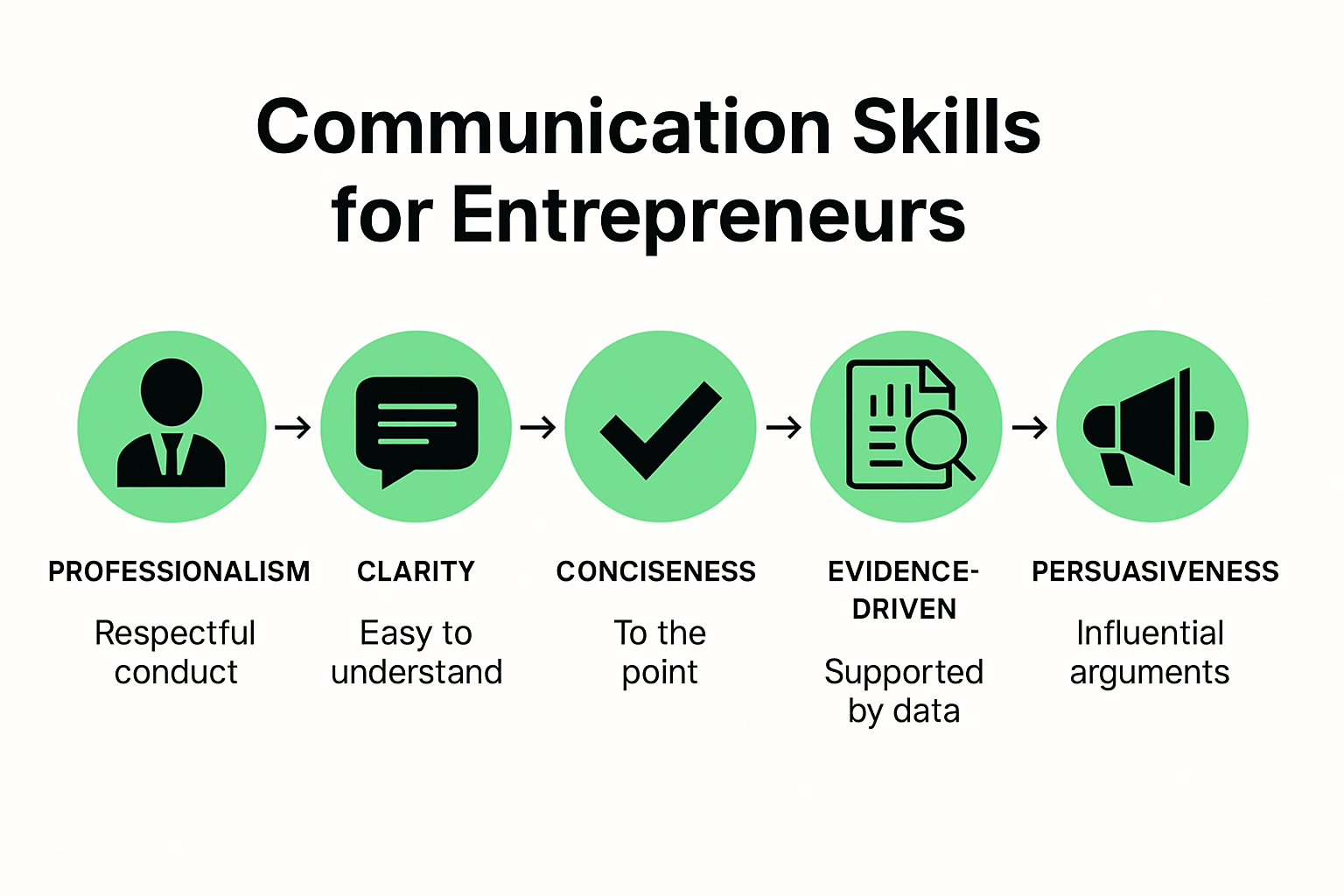
Business Communication Skills for Aspiring Entrepreneurs 2025
Business communication skills are shaping the fate of startups in 2025, turning everyday conversations into million-dollar opportunities and strategic partnerships. Most people think slick pitches or social media tricks are all it takes, but having the right words is only one small piece. The real surprise is that entrepreneurs with strong communication skills are 50 percent more likely to attract investment and build lasting teams, making these abilities the rocket fuel that launches simple ideas into industry-disrupting companies.
Table of Contents
- Why Business Communication Skills Matter
- The Strategic Impact Of Effective Communication
- Communication As A Competitive Advantage
- Core Skills Every New Entrepreneur Needs
- Strategic Communication Competencies
- Adaptable Communication Strategies
- How To Improve Communication For Business Success
- Understanding Communication Fundamentals
- Practical Strategies For Communication Skill Development
- Real-World Examples For First-Time Founders
- Learning From Corporate Communication Masterpieces
- Startup Communication Challenges And Solutions
Quick Summary
Why Business Communication Skills Matter
In the competitive entrepreneurial ecosystem of 2025, business communication skills are not just a nice to have—they are the critical foundation for transforming innovative ideas into successful ventures. Entrepreneurs who master these skills gain a significant competitive advantage that can mean the difference between startup success and failure.
The Strategic Impact of Effective Communication
Entrepreneurs are storytellers, persuaders, and vision architects. According to the Association to Advance Collegiate Schools of Business, communication proficiency directly influences an entrepreneur’s ability to secure investments, attract top talent, and build robust business relationships. Effective communication transcends mere verbal exchange—it involves articulating complex ideas with clarity, empathy, and strategic precision.
Nonverbal communication plays an equally crucial role. Research published in the Journal of Management Theory and Practice highlights that entrepreneurs who understand the nuanced language of body language, tone, and gesture can significantly enhance their persuasive capabilities. Imagine pitching to investors: your words matter, but your confidence, posture, and emotional intelligence can be the subtle differentiators that seal the deal.
Communication as a Competitive Advantage
In an era of information overload, entrepreneurs who communicate with precision stand out. Learn more about crafting compelling business pitches that capture attention and drive action. The ability to distill complex concepts into digestible narratives is not just a skill—it’s a strategic weapon.
Consider the multifaceted communication challenges entrepreneurs face: negotiating with partners, motivating teams, attracting investors, and connecting with customers. Each interaction requires a nuanced communication approach. Successful entrepreneurs understand that communication is a dynamic skill that adapts to different contexts, audiences, and objectives.
Key communication competencies include active listening, emotional intelligence, storytelling, clarity of expression, and the ability to read and respond to nonverbal cues. These skills enable entrepreneurs to build trust, resolve conflicts, and create compelling narratives around their business vision.
Moreover, in the digital age, communication extends beyond face-to-face interactions. Mastering written communication through emails, proposals, social media, and digital platforms is equally critical. An entrepreneur’s written communication can open doors, establish credibility, and create lasting professional impressions.
Ultimately, business communication skills are the bridge between potential and success. They transform innovative ideas from abstract concepts into tangible, actionable strategies that can disrupt markets and create meaningful change. For aspiring entrepreneurs in 2025, investing in communication skills is not optional—it is the fundamental pathway to turning entrepreneurial dreams into reality.
Core Skills Every New Entrepreneur Needs
Successful entrepreneurship is a complex journey that demands a robust set of communication skills capable of navigating complex business landscapes. While technical expertise provides the foundation, communication skills serve as the critical infrastructure that transforms potential into tangible business success.
Strategic Communication Competencies
The Community College of Baltimore County emphasizes that entrepreneurs must develop a comprehensive communication toolkit that goes beyond simple verbal exchanges. According to their research, core communication skills are not just about speaking—they are about strategic engagement.
According to the Association to Advance Collegiate Schools of Business, five essential communication competencies define entrepreneurial excellence:
- Professionalism: Maintaining a consistent, respectful tone across all interactions
- Clarity: Articulating complex ideas in straightforward, accessible language
- Conciseness: Delivering information efficiently without unnecessary complexity
- Evidence-Driven Messaging: Supporting arguments with credible data and research
- Persuasiveness: Crafting narratives that inspire action and commitment
Here’s a summary table organizing the five essential communication competencies and their focus for entrepreneurs:
These five competencies form the foundation for a strategic communication approach in entrepreneurship.
Adaptable Communication Strategies
Discover innovative approaches to business problem solving that leverage advanced communication techniques. Modern entrepreneurs must master multiple communication channels and adapt their approach based on context, audience, and desired outcome.
Salesforce highlights ten critical communication skills that entrepreneurs must cultivate:
- Active listening to understand stakeholder perspectives
- Emotional intelligence for navigating complex interpersonal dynamics
- Nonverbal communication skills that reinforce verbal messages
- Conflict resolution techniques that transform challenges into opportunities
- Digital communication proficiency across various platforms
The digital era demands entrepreneurs who can seamlessly transition between in-person interactions, video conferences, written communications, and social media engagement. Each medium requires a nuanced approach that maintains authenticity while achieving strategic objectives.
Beyond technical skills, successful communication requires genuine curiosity, empathy, and a commitment to continuous learning. Entrepreneurs who view communication as a dynamic, evolving skill set position themselves to build stronger networks, attract investment, and create lasting business relationships.
Ultimately, communication is not just about transmitting information—it is about creating connections, inspiring trust, and transforming abstract ideas into actionable strategies. For new entrepreneurs in 2025, mastering these communication skills is not optional. It is the fundamental differentiator between those who merely start businesses and those who genuinely lead and innovate.
How to Improve Communication for Business Success

Improving communication skills is a deliberate and strategic process that requires consistent practice, self-awareness, and a commitment to continuous learning. For entrepreneurs in 2025, mastering communication is not just about talking—it is about creating meaningful connections that drive business success.
Understanding Communication Fundamentals
University Canada West emphasizes the critical importance of understanding your audience as the first step in effective communication. This means developing the ability to tailor your message to specific stakeholders, whether they are investors, team members, customers, or potential partners.
According to The Royal Academy of Engineering, high-quality communication in an entrepreneurial context involves several key features:
- Clarity of purpose
- Precise and concise messaging
- Adaptability to different communication contexts
- Understanding of audience expectations
- Demonstrated expertise and credibility
Practical Strategies for Communication Skill Development
Learn powerful pitching techniques for aspiring founders that can transform your communication approach. Developing communication skills requires a multifaceted strategy that goes beyond traditional training methods.
Key strategies for improving communication include:
- Active Listening Training: Practice listening without interrupting, ask clarifying questions, and demonstrate genuine understanding.
- Public Speaking Practice: Join platforms like Toastmasters or local entrepreneurial groups to develop confidence and articulation skills.
- Digital Communication Workshops: Attend specialized training on effective email writing, social media communication, and virtual presentation techniques.
- Emotional Intelligence Development: Invest in workshops and resources that help you understand and manage emotional dynamics in business interactions.
- Feedback and Reflection: Regularly seek constructive feedback from mentors, peers, and professional communication coaches.
To help you quickly review actionable methods, here’s a summary table of practical strategies for developing business communication skills as recommended in this section:
This table outlines structured approaches that entrepreneurs can implement right away for skill improvement.
The Journal of Management Theory and Practice recommends in-house training programs specifically designed to address communication skill gaps among entrepreneurs. These programs should focus on practical, scenario-based learning that simulates real-world business communication challenges.
Technology also plays a crucial role in communication skill improvement. Utilize AI-powered communication analysis tools, record and review your presentations, and leverage online platforms that provide personalized communication skill assessments and improvement recommendations.
Entrepreneurs should view communication skill development as an ongoing journey. The most successful business leaders are those who remain curious, adaptable, and committed to refining their ability to connect, persuade, and inspire.
Remember, great communication is not about perfection—it is about genuine connection, empathy, and the ability to translate complex ideas into compelling narratives that resonate with your audience. By investing time and effort into developing these skills, entrepreneurs can create powerful communication strategies that differentiate them in a competitive business landscape.
Real-World Examples for First-Time Founders
Real-world communication case studies provide invaluable insights for first-time founders, offering practical lessons that transcend theoretical knowledge. By examining successful entrepreneurial communication strategies, new founders can develop a nuanced understanding of how effective messaging can transform business trajectories.
Learning from Corporate Communication Masterpieces
Pepperdine University’s Graziadio Business School highlights several iconic communication moments that demonstrate extraordinary entrepreneurial communication skills. Steve Jobs’ iPhone launch presentation serves as a quintessential example of storytelling and strategic messaging. Jobs did not merely introduce a product—he crafted a narrative that reimagined mobile technology, using clear, compelling language that connected emotionally with his audience.
Another powerful example comes from Starbucks’ response to a racial bias incident, which showcased transparent, empathetic communication. The company’s leadership demonstrated how authentic communication can transform a potential crisis into an opportunity for organizational growth and social responsibility.
Startup Communication Challenges and Solutions
Discover strategies for finding the right business partners that can help you navigate complex communication landscapes. ResearchGate’s study on entrepreneurial communication reveals that first-time founders often struggle with:
- Communicating complex technical concepts to non-technical stakeholders
- Maintaining consistent messaging across different platforms
- Balancing confidence with humility
- Adapting communication style for investors, team members, and customers
Successful founders develop a communication approach that is:
- Adaptable: Shifting tone and detail level based on audience
- Transparent: Sharing both successes and challenges
- Consistent: Maintaining a clear brand voice
- Empathetic: Understanding and addressing stakeholder perspectives
From the Business Communication for Success textbook, we learn that effective communication is not about perfection, but about connection. Founders who master this principle can turn potential communication barriers into opportunities for deeper engagement.
Entrepreneurial communication extends beyond verbal exchanges. It encompasses email correspondence, pitch decks, social media presence, and even non-verbal cues. Each interaction is an opportunity to build trust, demonstrate competence, and differentiate your venture.
Consider communication as a strategic asset. Young founders who invest time in understanding communication nuances position themselves to build stronger networks, attract better talent, and create more compelling business narratives. The most successful entrepreneurs are not necessarily the most technically skilled, but those who can articulate their vision with clarity, passion, and authenticity.
Remember, communication is a skill that can be learned and refined. By studying real-world examples, seeking feedback, and remaining curious, first-time founders can develop communication capabilities that become a significant competitive advantage in the complex world of entrepreneurship.

Frequently Asked Questions
What are the essential communication skills for entrepreneurs?
Effective entrepreneurs should develop core communication skills such as professionalism, clarity, conciseness, evidence-driven messaging, and persuasiveness. These competencies help in building strong relationships and driving business success.
How can I improve my business communication skills?
Improving communication skills involves active listening training, public speaking practice, attending digital communication workshops, emotional intelligence development, and regularly seeking feedback from peers and mentors.
Why is communication important for startups in 2025?
In 2025, effective communication is crucial for startups to secure investments, attract top talent, and create strategic partnerships. Strong communication skills can differentiate successful entrepreneurs from their competitors.
How can I adapt my communication style based on my audience?
Understanding your audience’s needs and preferences allows you to tailor your messages accordingly. Whether interacting with investors, team members, or customers, adjusting your tone, terminology, and delivery method ensures your communication resonates effectively.
Transform Communication Skills Into Your Business Advantage
Are you struggling to turn ideas into clear, impactful business conversations? The article on business communication skills highlights common challenges for entrepreneurs such as pitching with confidence, adapting your communication for different audiences, and using active listening to attract investment or build your team. These are real stumbling blocks when so much hangs on your words and your ability to build trust fast.
With siift, you get more than generic feedback—you receive step-by-step guidance and actionable insights that bridge the gap between what you want to say and how it lands. Our AI gives you personalized recommendations for clarity, strategic storytelling, and audience-specific messaging. If you want to de-risk your founder’s journey and master the art of business communication, start your journey today. Become the founder who stands out for clear vision and unstoppable connection. Visit siift and see how better communication can set your business apart now.
Recommended
- blog | siift | Business Problem Solving for New Entrepreneurs in 2025
- blog | siift | How to Find Business Ideas in 2025: Proven Steps for Students and New Grads
- blog | siift | Building a Business Network: Practical Steps for Beginners in 2025
- blog | siift | How to Pitch Ideas in 2025: A Guide for Aspiring Founders
- Communication interne efficace : stratégies gagnantes pour 2025
- Top Contract Negotiation Tips for SMBs and Startups 2025 - Loft Legal

see where you stand





.svg)
.svg.png)



.svg)

